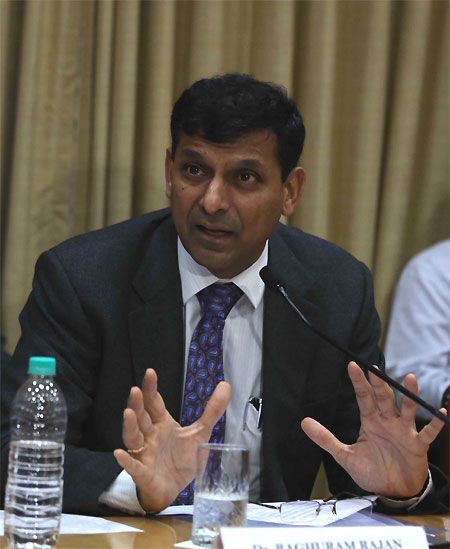 | « Back to article | Print this article |

RBI Governor also warned that the central banks globally might have engendered excessive fragility in the system.
Amid concerns in India and other global markets about uncertainty over a rate hike in the US, Reserve Bank of India Governor Raghuram Rajan on Friday sought to play down fears saying markets should not be scared of volatility as it would be transient in nature.
He also said finance ‘is only a lubricant to growth’ and it would be the overall economic policies of the countries that would determine their basic growth momentum.
Addressing the plenary session of the B20 meet, an informal grouping of business leaders from G20 countries, Rajan referred to issues facing the global economy and said the problems include people saving more and spending less, low productivity and low investments.
But the solution is that ‘we should not be scared of volatility’, he said.
Referring to uncertainties about a rate hike in the US, he said return to monetary policy normalcy would address the concerns over volatility in the future.
Rajan also warned that the central banks globally might have engendered excessive fragility in the system.
The B20 grouping engages with the G20 governments on behalf of the international business community and it is organising its own meeting here on the sidelines of the G20 minister-level meetings.
The other panelists in the session on 'navigating through the global low growth and low interest rate environment' included International Monetary Fund chief Christine Lagarde as also the central bank governors of France, Turkey and Mexico.
Lagarde said the G20 leaders need to respond to the calls for creating jobs.
On what was holding back the investments, the panelists named lower global growth prospects and structural confidence related aspects such as business environment.
Lagarde emphasised on three broad areas -- efficient investment in infrastructure, financial reforms and labour and product market reforms.
The panelists observed that the global economy is recovering at a moderate pace since the end of the global financial crisis.
In order to support the recovery, monetary policy in the developed world has remained accommodative through lower policy rates and expanded central bank balance sheets, they said.
They felt that this has led to not only lower short-term interest rates but also lower long-term interest rates.
Despite recent prospects of policy normalisation in some advanced economies, interest rates are likely to stay low in the coming years as well, reflecting the downward revised growth potential and very low inflation rates especially in the developed economies.
This environment coupled with slowing productivity growth and low investment rates poses challenges for central banks across the world.
Extraordinarily low interest rates for an exceptionally long time, in nominal and inflation-adjusted terms, raises questions about its efficacy, its potential threats for financial stability and hence the need for an expanded set of policy tools.
Image: RBI Governor Raghuram Rajan. Photograph: Reuters